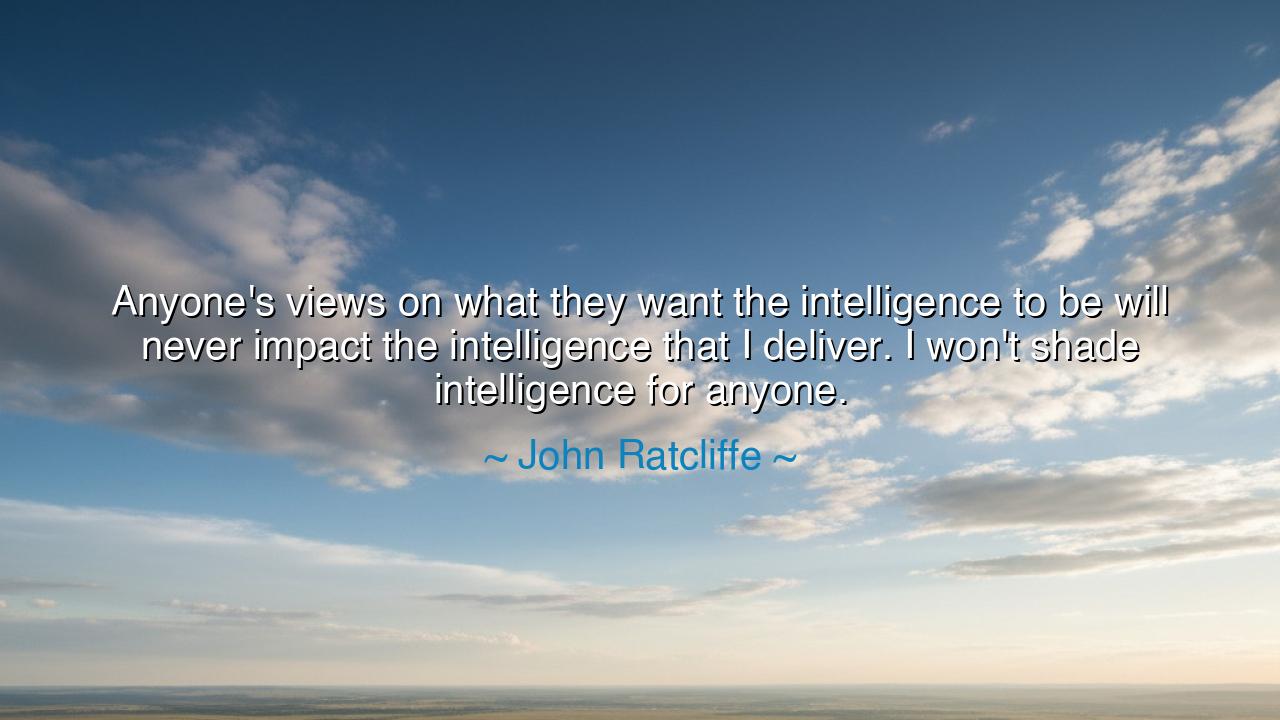
Anyone's views on what they want the intelligence to be will
Anyone's views on what they want the intelligence to be will never impact the intelligence that I deliver. I won't shade intelligence for anyone.






“Anyone’s views on what they want the intelligence to be will never impact the intelligence that I deliver. I won’t shade intelligence for anyone.” Thus spoke John Ratcliffe, the former Director of National Intelligence of the United States — a man whose duty was to seek truth amidst shadows, to guard a nation not through weapon or army, but through clarity of mind and integrity of purpose. In these words, Ratcliffe declares a principle as old as justice itself: that truth must never bend to desire, nor should the messenger of truth distort it to please kings or courts. It is the creed of every guardian of wisdom, every keeper of fact — that honor lies not in obedience to power, but in fidelity to reality.
The origin of this quote lies in Ratcliffe’s public defense of the independence of intelligence — a defense made during a time when political tempests raged, and the truth itself seemed a contested ground. As Director of National Intelligence, he bore the weighty responsibility of interpreting the world’s secrets, of discerning danger from deceit. His words were born from that crucible: an affirmation that the purity of intelligence must stand above the noise of politics, just as the light of the sun shines above the clouds. To “shade intelligence,” as he says, would be to betray not only one’s office, but one’s soul — to turn the sacred duty of truth-telling into a tool for ambition.
In a deeper sense, Ratcliffe’s words speak not only to the craft of intelligence, but to the very heart of integrity. For in every age and every calling, there are forces that seek to reshape truth into convenience. The merchant shades his scales for profit; the courtier flatters the ruler for favor; the scholar twists his findings to please his patrons. Yet history teaches that civilizations crumble not from weakness, but from falsehood — from the slow erosion of truth beneath the weight of self-interest. Thus, Ratcliffe’s vow is more than a personal pledge; it is a warning to all who would walk the path of duty: truth must stand unshaded, or the world will fall into darkness.
Consider the fate of Galileo Galilei, the astronomer who gazed at the heavens and saw the earth in motion. When the mighty Church demanded that he silence his discovery, he could have shaded his truth, as others did, and lived in comfort. But he refused. Though he was forced to recant, his unshaded intelligence — his courage to speak what was real — became a torch for all future seekers of knowledge. Like Ratcliffe, Galileo understood that truth, once dimmed, loses its power to guide. To tell the truth as it is, without color or compromise, is to stand in the lineage of prophets, scientists, and statesmen who have guarded civilization’s conscience.
Ratcliffe’s assertion also reveals the eternal tension between truth and power. Power desires control — over land, over people, and often, over perception. Truth, by its nature, defies control; it is as untamable as fire. Thus, those who hold truth in their hands must walk a narrow road. To deliver intelligence — uncolored by agenda, unswayed by fear — is to wield a sword that cuts both ways. It defends the nation, but it may wound the pride of those in authority. The one who bears it must therefore possess a heart of iron and a conscience of light. For to serve truth faithfully is the highest form of courage, and the rarest.
This wisdom stretches beyond the realm of governments and into the realm of the soul. For each of us, in our own small sphere, is an intelligence officer — a guardian of what we know to be true. Every day, we are tempted to shade the truth: to tell ourselves comforting lies, to twist perception to fit desire. But when we do, we lose clarity — first of mind, then of spirit. The man who deceives others wounds his reputation; the man who deceives himself destroys his soul. Therefore, Ratcliffe’s declaration becomes not merely professional doctrine, but moral commandment: never distort truth to serve comfort or fear.
Let this be the lesson carried forward: truth must remain unshaded, no matter the cost. Whether in politics, science, or the quiet dealings of the heart, do not let your vision be colored by what you wish to see. Seek facts, not flattery; insight, not influence. Speak honestly, even when silence would be safer. Stand as Ratcliffe stood — firm, unbending, committed to truth not as a weapon, but as a light. For nations, like souls, survive only when guided by those who refuse to shade the truth.
And so, remember this ancient teaching, renewed in modern words: truth is the guardian of freedom, and integrity its loyal servant. He who delivers truth without distortion serves both his people and his own soul. Be such a person — for in an age of shadows, the one who will not shade the light becomes the world’s only hope.






AAdministratorAdministrator
Welcome, honored guests. Please leave a comment, we will respond soon